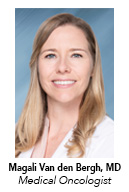Magali Van den Bergh, MD Is Lead Author of Chapter on Myelodysplastic Syndrome in Comprehensive Oncology Book & Resource Guide
Magali Van den Bergh, MD Is Lead Author of Chapter on Myelodysplastic Syndrome in Comprehensive Oncology Book & Resource Guide
Fort Myers, Fla., May 21, 2020 —— Medical oncologist Magali Van den Bergh MD, who practices in Florida Cancer Specialists & Research Institute (FCS) locations in Cape Coral and Fort Myers, is first author of the book chapter “Myelodysplastic Syndrome,” which was recently published in the e-book and print versions of Geriatric Oncology, edited by Martine Extermann, a world-renowned leader in the field of geriatric oncology.
Published in a format that allows constant updating as more information becomes available, the book offers a comprehensive resource for both clinicians and researchers. Because Geriatric Oncology is published online, it is “ … an ideal format …” for blending thorough coverage of current knowledge with the ability to constantly update information via a peer-review process.

Dr. Van den Bergh said, “This book is an important tool that provides in-depth information to assist in the treatment of geriatric oncology patients and I am pleased to contribute to the chapter on myelodysplastic syndromes (MDS). As we learn more from clinical research, we are beginning to better focus specifically in the area of geriatric oncology, which often has been insufficiently detailed.”
The chapter on myelodysplastic syndrome details the evolution of our understanding of MDS, discussing key data, including the epidemiology, etiology, diagnosis and classification of the disease, as well as current and emerging treatment modalities. Managing MDS is often complicated by the fact that the majority of patients are elderly, with preexisting conditions, who may not be able to tolerate intensive treatment. As stated in the closing section of the chapter, “MDS is a particularly challenging entity given the heterogeneity of this disease and the complicated elderly patients that compromise the majority of those afflicted. Newer and more efficacious therapies are needed to advance the overall outlook of elderly patients with MDS.”
##
To read the Abstract:
https://link.springer.com/referenceworkentry/10.1007%2F978-3-319-44870-1_46-1
